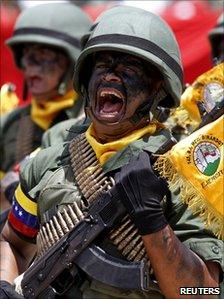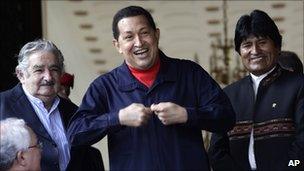Venezuela bicentenary: Chavez health doubts cloud party
- Published

Large numbers of Venezuelan soldiers took part in the parade
Air force jets flying in formation over Caracas signalled the official start of Venezuela's bicentennial celebrations, releasing smoke in their wake in the colours of the Venezuelan flag - red, blue and yellow.
Thousands of spectators lined a ceremonial avenue, the Avenida Los Proceres, to watch units from the army, navy and air force march past. Some units had tanks, others were on horseback.
Some were dressed as officers or soldiers from 1811, the year Venezuela signed its declaration of independence from Spain.
Most of the crowd were dressed in red to show their support for President Hugo Chavez and his socialist party, reflecting the fact that these celebrations were as much about present day politics as about past victories.
The socialist government has used the bicentenary as its own brand, drawing parallels between the independence struggle and its own "Bolivarian revolution". President Chavez has even renamed an expropriated chain of supermarkets "Bicentenario".
At the march, some in the crowd chanted "he's back, he's back", referring to President Chavez's return from Cuba on Monday after receiving treatment for cancer.
But the president was conspicuous by his absence, having stayed at the presidential palace in central Caracas.
From there he officially got proceedings under way by video link, and posted messages on the micro-blogging site Twitter throughout the march.
Usually a man at the forefront of everything his government does, President Chavez has acknowledged in recent days that his diagnosis and treatment for cancer are forcing him to slow down and he will not be able to make the same number of public appearances that he once used to.
But how long this will go on for is still a mystery.
No obvious successor
The government has been reluctant to release any details regarding the president's health, insisting for weeks that he was being treated in Cuba for a pelvic abscess.
Although the president disclosed to the public last week that he had had surgery to remove cancerous cells, little else is known about the president's diagnosis or treatment.
"A pelvic abscess could point to cancer of the anus, rectum or prostate, but without knowing what his diagnosis is and what treatment he's undergone so far, it's impossible to say how long it might take him to recover," Venezuelan oncologist Sunil Daryanani told the BBC.

During the celebrations, Hugo Chavez met visiting dignitaries at the Miraflores presidential palace
While the president has tried to be upbeat about his illness, insisting that he can continue to lead the country even while he is receiving treatment, opposition politicians have called into question his ability simultaneously to lead Venezuela and look after his own health.
"It's logical that he should battle [this cancer] and even challenge nature, but Venezuela is also facing many difficulties," an opposition politician and mayor of Caracas, Antonio Ledezma, told a local television channel.
Hugo Chavez appears determined to do both for the time being, but his prolonged absence has caused some to wonder about the future of his socialist party should he become so ill that he has to step aside.
He has no obvious successor.
"[Party members] should be seriously revising their plans because they need leadership in an emergency and they need to realise that they can share power [within the party]," said Nicmer Evans, a leftwing analyst at Venezuela's Central University.
As for the longer term, will President Chavez be standing as a candidate in next year's presidential election?
It is highly unlikely that he will step aside before then, Evans says, but "it cannot be ruled out".
Before campaigning gets under way, the president already has plenty to concern him.
While speculation about his health over the last few weeks has certainly distracted many within the country from some of Venezuela's most pressing issues, those problems - such as the lack of electricity, high inflation and a sluggish economy - have not gone away.
- Published5 July 2011
- Published5 July 2011
- Published18 February 2013
- Published5 July 2010